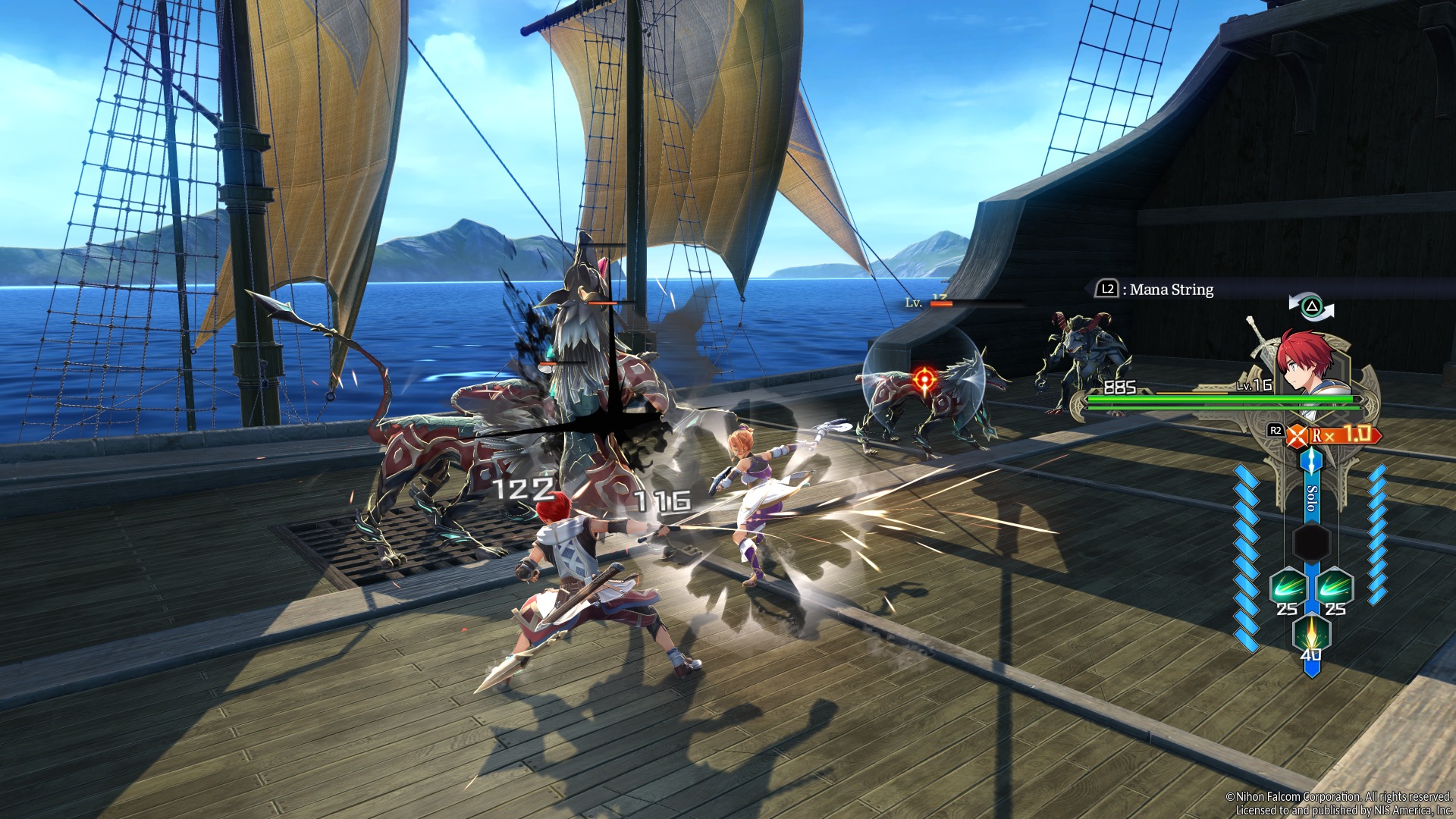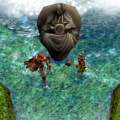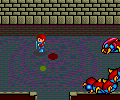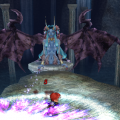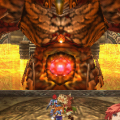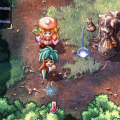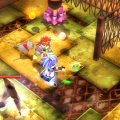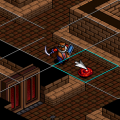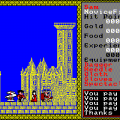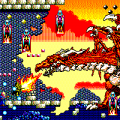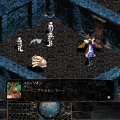- Ys Book I & II
- Ys III: Wanderers from Ys
- Ys IV: Dawn of Ys / Mask of the Sun
- Ys V: Ushinawareta Suna no Miyako Kefin
- Ys VI: The Ark of Napishtim
- Ys: The Oath in Felghana
- Ys Origin
- Ys Seven
- Ys: Memories of Celceta
- Ys VIII: Lacrimosa of Dana
- Lacrimosa of Dana (Novel)
- Ys IX: Monstrum Nox
- Ys X: Nordics
- Ys Strategy
- Ys: The Call of Solum
- Ys vs. Sora no Kiseki: Alternative Saga
- Ys (Anime)
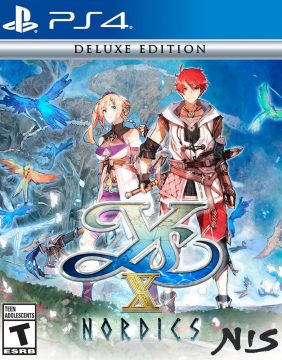
Ys X: Nordics takes place very early on in the series timeline, set right after Ys II and before Ys IV, as Adol and Dogi take to the seas towards the land of Celceta. However, their journey is waylaid as they sail through the Obelia Gulf, where they’re taken captive by the Balta Sea Force. This Viking-like army of warriors aren’t technically pirates, but they effectively act as a protection force for the area, allowing safe passage through their territory as long as you’re willing to pay. It’s here that Adol meets up with Karja, the so-called Pirate Princess and daughter of the Sea Force’s leader.
Before Adol can go on his merry way, the town of Carnac is invaded by mysterious enemies called Griegr. During the assault, Adol and Karja are shackled to each other with a pair of magical handcuffs, keeping the unwilling pair at a close distance. Their only clues, beyond stopping the Griegr invasion, involve a mysterious woman named Lila, who communicates through a seashell. Further complicating matters is a curse put on Adol that will slowly choke him to death, unless he can take down the Griegr leaders. After assembling a ramshackle boat called the Sandras, the pair take the high seas, rescuing Carnac’s residents and adding them to the crew while hunting down the villains.
Characters
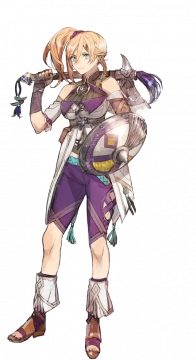
Karja Balta
Daughter of Grimson Balta and a leader in the Balta Sea Force, Karja normally wears an imposing mask that strikes fear in the hearts of civilians. Despite her age, she’s immensely strong and skilled with her axe, having been raised in the warrior-like Norman culture.
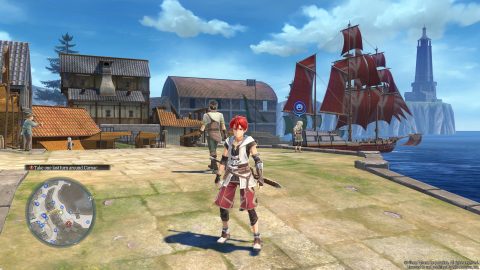
There’s no regular overworld in Ys X, so instead you sail around a vast ocean, visiting islands to both advance the plot and run sidequests. While you’re floating around, you’ll also find purple lights, which will trigger sea combat when you run into them. At the outset, your ship is pretty slow, sauntering along lazily and only speeding up through brief speed bursts and wind paths. During combat, at first you only have a single cannon that fires forward, as well as a strong barrage that only works in close quarters. Plus, you can also ram into enemies, if you’d like to channel the old Ys days of bump combat. However, what starts off as a dull and tedious affair becomes far more engrossing by the game’s midway point, as you’re given the opportunity to freely roam the seas and increase the Sandras’ abilities. You can also fast travel to almost any previous point, so getting around is pretty painless once you get into it.
Much like Ys VIII and IX, and to a further extent Skies of Arcadia and Suikoden, rescuing various citizens will unlock new enhancements as well as giving them a place in the ship’s hold, where they perform various functions like selling items, upgrading equipment, cooking food, creating medicine, and attending to Pikkards, the cute guinea pig-like animal found in the Ys games. They also provide bonuses for the island recapture segments, which replace the Beast Raids from Ys VIII and the Grimwald Nox fights from Ys IX. Here, you mount an attack on occupied islands by fighting a few rounds of a sea battle before running through a few challenge rooms, where you’re granted various rewards for your performance.
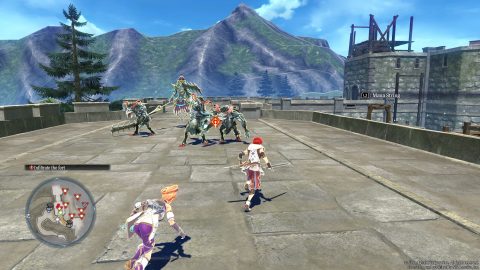
Despite seafaring being a big focus of Ys X, you’ll likely spend more time on foot, as Adol and Karja explore various small islands for survivors or loot or attack Griegr forts. Fundamentally, the combat in Ys X is a lot like the past two entries, with one major change – the party system is gone, and the only playable characters are Adol and Karja. Each has their own skills, and you can swap between them any time. You can also hold down a button to enter Duo mode and control both of them at once, effectively doubling your attacks while also enabling a whole separate set of powerful Duo skills. The Flash Dodge and Guard moves are technically gone, replaced by a different set of moves – if enemies glow blue before they attack, then you can dash into them to dodge them, while red blows signify powerful attacks that you can parry if you block at just the right moment. Successfully pulling either of these off will trigger a brief cutscene where you inflict massive damage.
Since Adol and Karja share the same experience meter, and their armaments are mostly the same outside of their weaponry, you can customize their abilities using the Release Line grid. You can either collect or craft various colored gems and place them around a board, increasing their stats or enabling various passive bonuses.
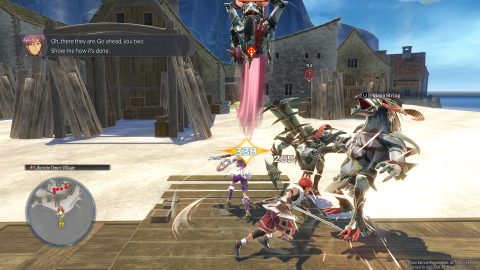
However, combat feels much heavier in this entry compared to the previous few entries, because the Duo mode emphasizes blocking rather than dodging. Entering Duo Mode will also let you block almost any enemy strike as long as you’re not attacking. Furthermore, blocking attacks in Duo Mode will increase the Revenge Meter, which multiplies the damage of any Duo attacks, encouraging you to absorb enemy blows to counterattack.
Duo Mode is so powerful that it ends up overwhelming the other combat subsystems. Technically Karja is better at breaking the enemy armor plates that absorb damage for stronger enemies, but from a practical standpoint, it doesn’t make too big of a difference. It’s a stark contrast of the light/heavy/projectile strengths and weaknesses of the previous Ys games that required you to switch up characters. Furthermore, you can build up a chain combo by repeatedly switching up skill moves between different moves, which increases your SP recovery. However, Duo moves are still super strong and they already regenerate SP quickly, leaving a function that’s fun to mess around with but one that’s ultimately redundant.
The movement abilities from Ys IX are gone, replaced with various Mana skills that let you swing around with a grappling hook or surf around on a hoverboard. There are a few pretty fun race sequences as you grind on glowing rails, including an impressive showdown with an enormous whale. However, the dungeons are still just mostly large, open, linear areas that lack the added verticality and platforming of Ys IX, so they’re not quite as compelling.

The story follows the template of the last few Ys games, where you spend a good amount of the game’s ten chapters exploring and building up your crew with little plot movement. It’s only near the end that it really kicks into gear, and while it may be predictable, it’s still a compelling tale. The Ys series has typically struggled a bit with storytelling, especially since the series grew out of its old school roots and tried to tell longer narratives. But much like Dana made for a compelling heroine in Ys VIII, this entry wisely follows up with that by making Karja the true protagonist of Ys X, since Adol is still just a bystander in her story. She’s strong and fierce, but still young and rough around the edges. She’s immediately thrown out of her routine when she needs to ditch her trademark mask and interact with citizens as a regular person instead of the fearsome Pirate Princess. Throughout the game, she also forms a powerful bond with Adol, and you can strongly feel their partnership development even though he’s still (mostly) a silent hero. Even though most of the Ys games are technically separate stories, they still have recurring characters – after all, Adol’s buddy Dogi still shows up here as a crewmate, as does Dr. Flair from Ys II – but it’ll be a great day whenever Adol (hopefully) runs into Karja again in a later game. The English translation is solid, as is the voice acting.
Visually, Ys X moves to a new 3D engine from the previous two games. This results in some nicer character models and some better lighting, plus better performance on weaker consoles like the Switch. However, like many Falcom titles, it also clearly suffers from its lack of budget, as many areas consist of the same nearly identical looking islands, and even other areas like dungeons and forts suffer from bland visuals. The seafaring also easily looks the worst of it, with noticeable draw distance issues and basic effects that make the game look rough for a game that came out in 2023. The character designs are fresh, coming from artist toi8 (Tokyo Mirage Sessions).
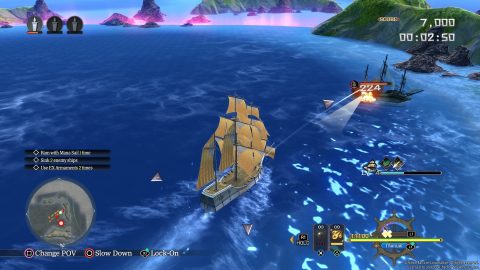
Still, this is more than made up for by the soundtrack, a hallmark of the Ys games and Falcom in general. While there’s no strong standout in the same manner as “Sunshine Coastline” from Ys VIII or “Quatera Woods” from Ys VI, this entry still has an outstanding array of field, combat, and dungeon themes, along with some pleasantly breezy sailing songs. Many of them are heavily guitar based, with piano and violin mixed in, much like the past two games. And several lean heavily on synthesizers, giving them a retro feel that hearkens back to the PC Engine redbook audio days.
Falcom isn’t a particularly large company, and as with some of their other games, you can see them pushing up against their limits. Ys X clearly wants to be a more ambitious game than their budget allows, but other than the middling visuals and repetitive landscapes, it doesn’t much hamper the overall experience. The ship exploration is fun when it ramps up, the combat is still tons of fun despite some of the changes, the soundtrack is full of bangers, and Karja is the best character ever featured in the Ys series. What’s especially noteworthy is how all the settings of these later Ys games – the deserted island of Ys VIII, the prison city of Ys IX, and now the open seas of this game – give each entry a unique identity, an impressive way to keep the series fresh after nearly forty years.
